Phone:
(701)814-6992
Physical address:
6296 Donnelly Plaza
Ratkeville, Bahamas.
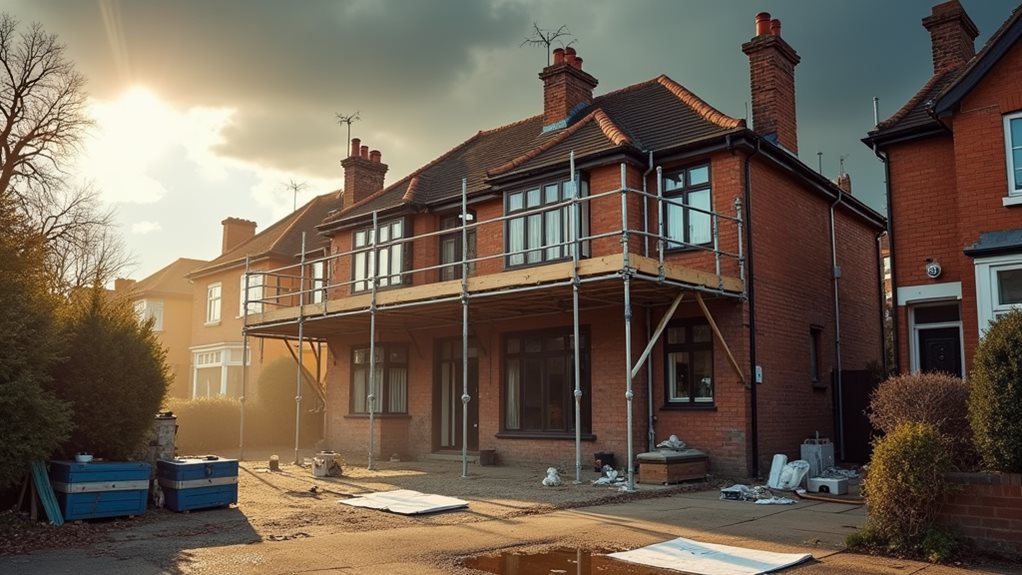
Planning a home extension in Manchester? Prepare for potential budget overruns, regulatory hurdles, and design conflicts that could impact your project.
When extending your home in Manchester, you'll face several key challenges. Budget overruns are common, so it's wise to maintain diligent financial management and set aside a contingency fund. Regulatory hurdles, such as securing planning permission and adhering to building codes, can create delays and additional stress. Design conflicts may arise, reflecting differing neighborhood aesthetics, and site access issues could hamper construction. Additionally, maintaining good neighbor relations is essential, as disputes over boundaries or privacy can complicate your plans. Embracing these challenges head-on can smooth the path forward, and there's much more to take into account as you plan your extension.
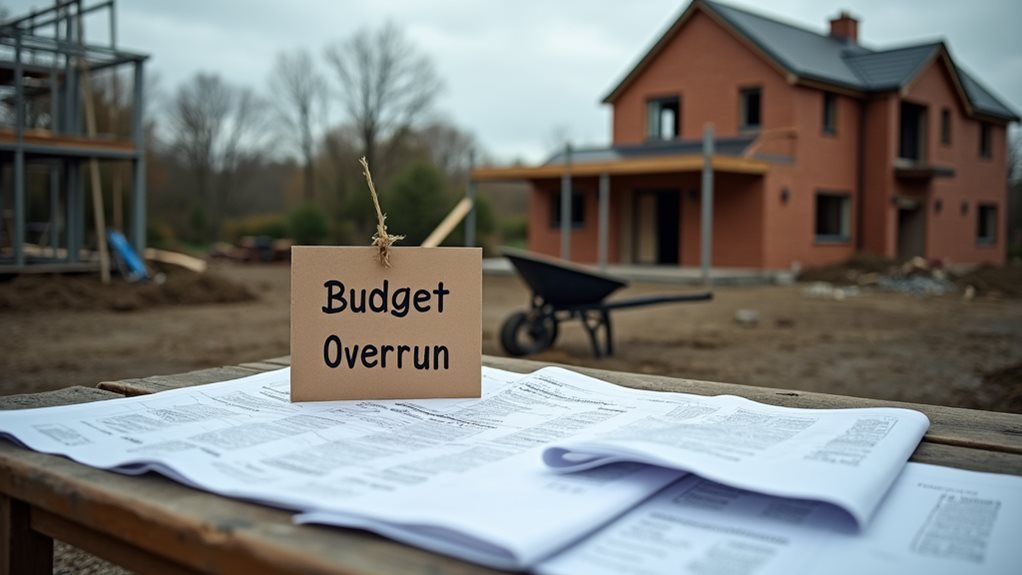
Budget overruns are a common headache for homeowners starting on extensions. You mightn't anticipate the complexities involved, which can lead to frustrating financial surprises that disrupt your plans.
Effective cost estimation and diligent budget management are vital to avoid these pitfalls. Unforeseen site conditions like poor soil quality can inflate your costs, but you can mitigate this by establishing a contingency fund during your planning phase. Additionally, consider the savings that can result from choosing a single-storey extension to save on costs as they are often more budget-friendly compared to double-storey options. Engaging local builders (skilled professionals) familiar with the area can also help in keeping costs manageable.
Remember, regular communication with your contractors is important. It helps you track expenses and address issues as they arise.
Prioritizing essential work is another strategy that can keep non-essential spending in check. You'll also want to be mindful of hidden costs within your original quote, as overlooked permits and inspections can sneak up on you.
Hiring experienced contractors can also save you a lot of grief, as their expertise often leads to more efficient project execution.
Monitor your project continuously and keep your budget updated. By following these steps, you create a supportive environment where you and your home can truly thrive, turning your extension dreams into reality without breaking the bank.
Unexpected costs aren't the only hurdle homeowners face when extending their properties; design changes can also throw a wrench in the works. When you're planning an extension, you'll need to guarantee compliance with local regulations, which often means seeking planning permission and creating detailed plans that adhere to building codes.
Accurate property line maps are essential to avoid any boundary disputes with neighbors. Moreover, structural integrity is key. Collaborating with architects and structural engineers helps you create feasible designs that reflect current design trends while fitting seamlessly into your home's architectural style.
Think about how natural light and aesthetics can impact both the look and feel of your space. It is also crucial to stay informed about local building regulations to ensure your designs do not run into legal complications.
Don't forget that builders play a significant role too. Their insights can lead to practical modifications that keep your budget in check and address any unforeseen challenges. By maintaining open lines of communication with your architect and builder, you can navigate these design changes smoothly, guaranteeing your extension turns out not just as beautiful as you envisioned but also functional and aligned with your neighbors' expectations.
After all, a well-planned extension can truly enhance your sense of belonging in your community.
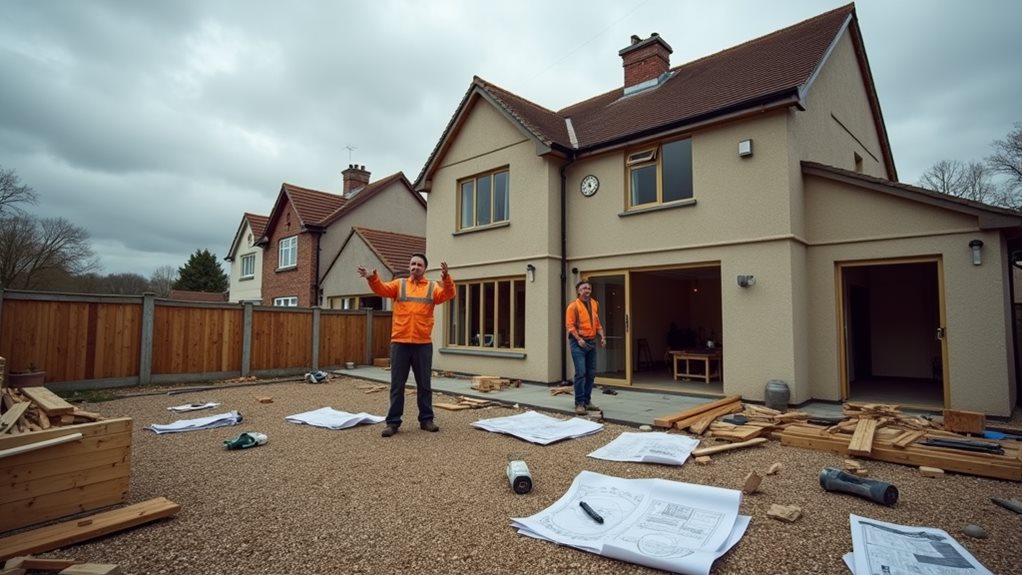
When you're extending your home, unexpected delays can really throw a wrench in your plans.
From the lengthy processes of securing planning permissions to the unpredictability of the weather, these obstacles can push your timeline off course.
To navigate these challenges, remain flexible with your schedule and budget, as it helps to have a plan B ready to go.
Maneuvering through the planning permission process can feel overwhelming, especially with the potential for unexpected delays. When you submit your application, the typical timeline runs up to eight weeks, but it can stretch to twenty due to backlogs and increased renovation activities. This uncertainty can disrupt your plans and force you to rethink timelines.
The decision-making process isn't just a simple yes or no; a committee appointed by the local council reviews your proposal, often leading to endless waiting. You might find yourself maneuvering the complexities of neighborhood notifications and public visibility of your application, which can further complicate matters.
With local authority planning departments often under-resourced, these bureaucratic hurdles can stall your project. While you might feel tempted to rush the process, it's vital to stay connected with your planning authority for updates.
Be prepared for potential changes in your original plans to comply with new regulations, or to address unforeseen complications. Keeping a flexible mindset can ease some of the frustrations that come with this intricate process.
Construction projects often face the frustrating reality of weather-related delays that can derail your carefully laid plans. In Manchester, unpredictable weather can greatly impact your timelines.
For instance, when temperatures dip below 3°C, laying brickwork becomes nearly impossible, and materials may not set correctly. Heavy rains saturate the soil, complicating foundation work, while storms not only disrupt schedules but can also risk water damage to your property.
You'll want to be proactive when considering weather predictions. By incorporating historical weather data into your planning, you can better anticipate potential delays and adjust your project schedule accordingly.
Seasonal adjustments are essential, as they allow you to plan around typical weather fluctuations that can affect construction timelines.
When you're planning to extend your home, site access can become a significant hurdle.
Limited road access and the need for construction equipment to fit through tight spaces can complicate everything, forcing you to contemplate alternative routes, like through a neighbor's property.
You'll need to plan carefully to navigate these challenges while keeping costs and project timelines in check.
Restricted road access can pose significant challenges for homeowners looking to extend their homes.
You'll quickly discover that getting materials on-site can be no small feat. Access solutions are often limited, requiring you to think creatively about construction logistics. For example, you might need to rent specialized equipment like micro diggers, which can fit through narrow doorways but come at a higher cost.
Manual excavations and the need to transport materials through your home can drive up both labor costs and construction time. It's wise to plan for increased disruptions, as you'll be dealing with more manual handling than usual.
If you're considering this route, protecting your hallways with plywood is a smart move to minimize damage.
You might even want to explore alternative access routes through neighboring properties, but be aware of local regulations that could limit your options.
Ultimately, it's crucial to budget for these unexpected expenses, as extended construction periods can lead to higher costs for labor and materials.
Homeowners often face a maze of legal and regulatory challenges regarding neighboring property rights when planning home extensions.
One key issue is ensuring you respect the property boundaries. Encroaching on your neighbor's space can spark neighbor disputes, leading to costly misunderstandings and further complexities.
To navigate these challenges smoothly, keep these points in mind:
Construction site access issues often pose significant challenges during home extensions. You'll likely encounter space constraints that can lead to delays and inefficiencies.
With limited working areas, overcrowding with equipment and materials not only hinders your project's progress but also creates safety hazards. Narrow access paths can restrict the size of machinery you can utilize, complicating your equipment logistics as you work towards space optimization.
You might face additional hurdles, such as narrow streets that hinder the movement of large equipment or restricted access times that can limit your working hours.
Proper planning is key; designated loading and unloading zones may be necessary to keep things running smoothly. Strategic placement of equipment can optimize the space you have, ensuring you're not left with clutter and disarray.
Communicating with neighbors and local authorities about your plans can help build goodwill and minimize disruptions.
Don't forget to reflect on emergency access routes and keep equipment maintenance up to date to avoid unexpected downtimes.
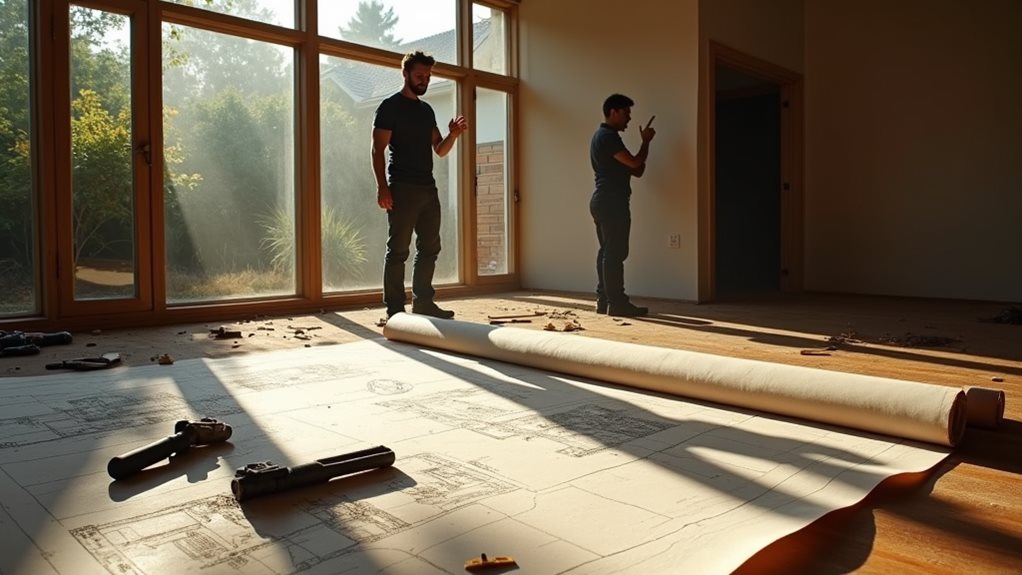
Often, disputes with contractors can emerge during home extension projects, complicating what should be an exciting process. Ensuring contractor reliability is critical, yet communication breakdowns can quickly lead to misunderstandings, delays, and frustration.
Here are four key challenges you may face:
While contractor disputes can be intimidating, being proactive about communication and contractual expectations can minimize complications.
Steering through the permit process can trip up even the most seasoned homeowners during an extension project. You might think it's merely a matter of filling out forms, but the permit requirements in Manchester can be intricate.
Planning permission is often necessary for major alterations and new structures, with specific rules sometimes applying in different areas, such as Article 4 Directions.
When tackling your project, it's vital to submit a Municipal Zoning Authorization application with your detailed plans and fee. Once submitted, the city's Planning and Zoning department will review your application, which must then be sent to the county authority for the actual building permit.
It's imperative to remember that progress inspections are required throughout the project, meaning you'll need to give 48 hours' notice each time.
Don't overlook the building inspections. They guarantee your work meets all regulations and receive final approval for occupancy.
Ultimately, just a minor misstep or misunderstanding about these inspection processes can lead to delays and extra costs. Staying informed and organized is key to maneuvering this often confusing aspect of home extension.
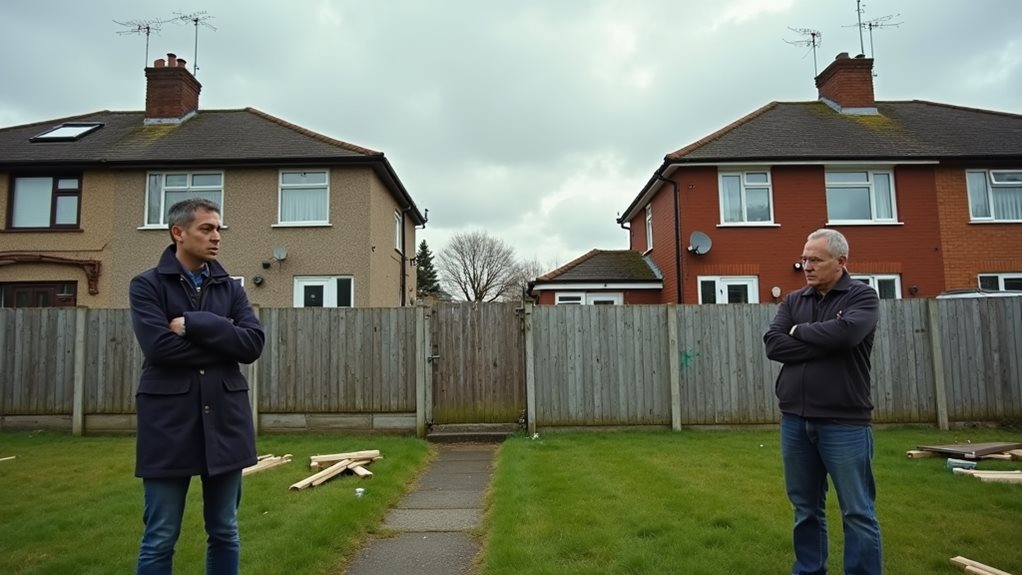
When you extend your home, maneuvering neighborhood disputes can become a significant challenge.
Issues like boundary accuracy, the right to light, and privacy violations often pop up, leading to tension with your neighbors.
Boundary accuracy issues can lead to frustrating neighborhood disputes, especially when home extensions get too close to shared property lines. If you're not careful, misunderstandings can arise over where your property ends and your neighbor's begins.
To avoid potential conflicts, consider these essential tips:
Taking these steps can prevent complicated disputes that not only affect neighborly relations but also impact your property value.
Homeowners often face additional challenges beyond boundary accuracy issues, particularly in relation to the right to light. When extending your home, it's vital to contemplate how your new development might impact your neighbors' access to natural light. Legal implications can arise if your extension obstructs this right, leading to disputes that can escalate quickly.
Conducting a right to light assessment early in the planning process is essential. This evaluation determines how your project might affect neighboring properties and helps prevent potential infringements. If your extension considerably reduces light to a neighbor's windows, they can take legal action, seek compensatory damages, or even request injunctions to stop construction.
Navigating these disputes isn't just about adhering to the law; it's about fostering good relationships within your community. Engaging in mediation can help you and your neighbors find a mutually agreeable solution before things become contentious.
Maneuvering your property extension can become complicated when privacy violations come into play, potentially sparking disputes with neighbors.
Privacy breaches often stem from high hedges or unauthorized extensions that can escalate tensions in your community. To help navigate these challenges, consider the following:
Ignoring privacy concerns mightn't just lead to strained neighbor relations but also potential enforcement actions from the Planning Compliance Team.
When considering an extension, maneuvering regulatory hurdles can feel like wading through a dense thicket. In Manchester, you'll need to tackle planning permission requirements first. If your plans notably alter your home's structure, you'll have to submit detailed designs that adhere to specific guidelines from local councils. Consulting with architects can simplify this process and guarantee your compliance strategies are on point.
Then there are the Building Regulations, which have seen regulatory updates lately, particularly due to the Building Safety Act 2022. For those living in high-rise buildings, compliance isn't just a suggestion; registration with the Building Safety Regulator is mandatory, and you'll need to maintain a safety case report regularly.
Don't overlook neighborhood and boundary issues either! It's important to respect your neighbors' rights regarding light and privacy, while also making sure your property lines are clearly defined. Misjudging these can lead to costly disputes, so consider consulting a conveyancing solicitor if you're unsure.
Navigating these regulatory hurdles is vital for a smooth extension process, allowing you to create the home you desire while keeping safety and community considerations in mind.
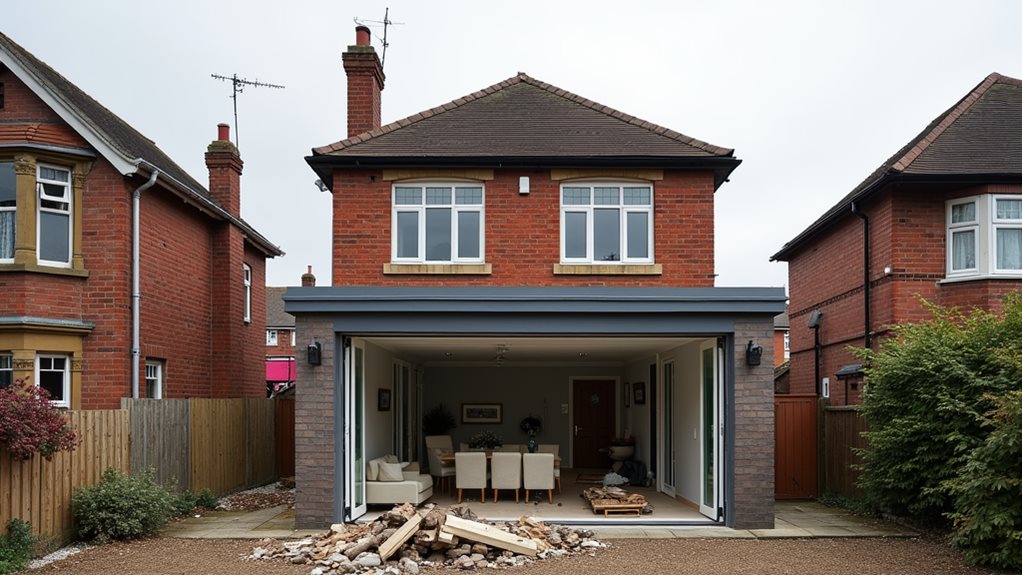
A homeowner's vision for a stylish extension can quickly collide with aesthetic controversies that spark heated debates within the community. You might find that your design choices trigger strong reactions, sometimes even dividing public opinion.
While some appreciate innovative adaptations, others may view them as disruptive to the neighborhood's character.
Here are four key challenges you may face regarding aesthetic controversies:
Navigating these controversies necessitates a thoughtful approach.
By respecting community identity and being open to feedback, you'll enhance the chances of your extension being accepted, fostering a sense of belonging rather than division.
Ultimately, striking that balance could elevate both your property's value and the overall aesthetic of your community.
Extending your home involves maneuvering complex compliance challenges that can complicate the process. Understanding planning permission is essential in Manchester, where significant alterations often require it.
While permitted development rights allow extensions up to six metres—eight for detached homes—you'll need to check for property restrictions that may not permit this. Remember, extensions can't exceed half the original ground area and must adhere to strict height regulations.
You should also consider the legal implications of your project. Involving a conveyancing solicitor can provide much-needed support, especially with restrictive covenants or boundary disputes that might arise.
They'll help you navigate the necessary legal paperwork, ensuring compliance with local regulations and protecting you from potential disputes.
Don't forget about building regulations, which focus on health and safety, separate from planning permission. Building inspectors will review your project, confirming that it respects privacy distances and doesn't negatively impact your neighbors or the street scene.
Finally, coordinate with your local authorities; planning applications can take up to eight weeks for a decision.
In steering through the challenges of home extensions in Manchester, it's essential to remain proactive and adaptable. Research shows that nearly 30% of homeowners encounter budget overruns, which emphasizes the importance of thorough planning and contingency funds. Remember, clear communication with contractors and neighbors can mitigate disputes and unexpected delays. By staying informed and prepared, you can turn your home extension dream into a reality, making your space more functional and enjoyable while avoiding common pitfalls.